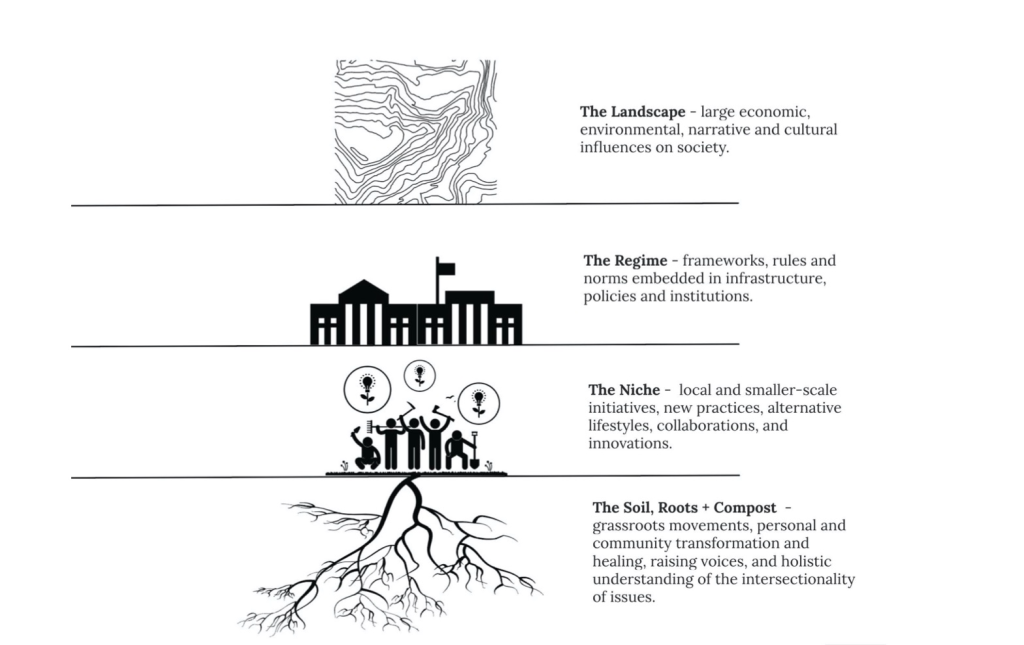Last week 12 different foundations from across Europe came together in Brussels for the Philanthropy in Transitions Practice Lab, hosted by Philea and co-led by myself and Jesper Christiansen from Bikubenfonden in Copenhagen.
This was the next iteration of the Community of Practice that we’d be running with Philea in 2020/2021 on Imagination, Foresight and Regenerative Futures and feels more necessary than ever. As Indy Johar commented over dinner on the first night:
‘We are in the midst of a big structural transition. This is post-war reconstruction plus a shift in ways of thinking and understanding that go back 400 years. A deep transformation in culture. We are not just addressing the fringes of market failure.’
In setting the scene for the Lab we talked about why the framing of our work and roles in relation to transition felt helpful, especially for moving beyond the binaries we all agreed felt entrenched in philanthropy at the moment. I spoke of how in the UK over the last three or four years there’s been these two growing camps: those who want to measure everything, who talk a lot about evidence, are data-driven, linear and technocratic, believe problems can be isolated and solved and that impact is something to strive for. And in reaction to that, there are those that say it’s all about relationships, we can’t measure anything because it’s all emergent, the only conversations to have are about ways to shift power, participatory grant-making will get us where we need to go and movements are where all resources should be directed. What’s helpful about a ‘transition’s’ framing is that it invites us to acknowledge how plural our approaches need to be. That if working in the ‘soil’ (see image below) the types of capital, the design of your funding strategy and how you deliver on that will likely be different from those working at the regime level with institutions and in the deep code, or at the niche level which always requires capital suited to exploration and experimentation.

Power Shift Framework (Fraser and Glass 2020), an adapted version of Geels et al’s Socio-technical Transitions Theory
The point is, we need to work at all these levels and those of us involved in moving resources need to be adept at not only that plurality but also the discernment of what approach is appropriate in which context.
During the course of the two days, we had a variety of presentations from those in the room – who shared how they were designing their strategies in relation to ‘transitions’ as well as sharing about how their organisations were also in transition. Something required of all of us working in philanthropy at this time is to meet this moment we are in – and that requires something different of ourselves, our organisations and our practices.
I shared some of the practices and approaches that feel important to pay attention to in these times of transition. This ranged from investing in shared foresight and considering who’s foresight, to valuing and exploring different kinds of intelligences – from the more-than-human, to the planetary, to the collective. We also talked about how we can’t pattern something different – or orient the transitions we’re in towards something different – without changing our current perception. This is where the need for world-building work comes in, ensuring that the soil from which new and different worlds are able to be both imagined and grown, is resourced. Sometimes this is also about creating the conditions for change – a readiness for change. Other work we talked about as being essential to transitions is that of hospicing and composting what is no longer needed, how important that work is to make way for the new – whether closing down organisations, projects, grant programmes or mindsets . The last part of my slides talk about the ‘hidden wiring’ and often to do more transformative work, many organisations need to shift their policies, practices, cultures and governance – as well as demonstrate what ‘hidden wiring’ is no longer fit-for-purpose in the wider world.
By the end of the two days we’d come up with a set of ideas, questions and practices to explore in relation to how to be, how to act, where to act, and with whom. And it was this kind of work we felt was most important to be held accountable to.
It can be helpful to encourage funders to report on their practice and to agree principles for things like better ‘grantmaking’ but what are the consequences of directing attention and energy towards things that are no guarantee of more transformational work being resourced? Whilst things like being more transparent and equitable are important, as a group, we were interested in how funders become accountable to meet this moment – a global poly crisis – that requires truly transformative funding. This would require funders going way beyond reporting on how usable their website is, to reflecting on and sharing what percentage of their money goes to plaster-sticking, tweaks and improvements, and what percentage to deep, long, transformative change.
This feels essential if we want to hold ourselves to account in doing more transformational philanthropic work. How are you ensuring that the work you do, and what you are resourcing, doesn’t just pattern what has come before?
If you want to join the Transitions in Philanthropy Lab then please get in touch with Stefanos at Philea (stefanos.oikonomou@philea.eu).
Thank you to Jesper at Bikuben Foundation, Graham Leicster of International Futures Forum and Indy Johar of Dark Matter Labs, who all shaped the Lab alongside Stefanos and I.
Cassie Robinson is working with Joseph Rowntree Foundation on Emerging Futures, Partners for a New Economy and Active Philanthropy on transformative wealth redistribution. She’s also co-leading a Philanthropy in Transitions Lab for Philea.






Comments (1)
Great to reflect with you Cassie... and important to consider the decade+-long view, both back and ahead. Deeply troubling to anyone who's dedicated time to system change, not to see it happen. Your point about echoing familiar patterns is well made. Thanks for sharing.